10 Genius Memory Hacks to Remember Everything Effortlessly
10 Genius Memory Hacks to Remember Everything Effortlessly
Tips for increasing memory by association.
Everything you need for the semester you want!
This bundle includes:
The Syllabus Study Planner
The Pomodoro Planner
A Confidence Tracker
A Q&A planner
The “Get Organized Checklist”
and more!
This workbook is full of super useful resources that can be applied to every aspect of your day.
* Disclaimer * Some of the posted links are affiliate programs. By clicking these links, I may receive monetary compensation. This will not alter the price or change the buyer's experience.
Every time you meet a piece of data, it’s stored in your brain. Retaining these facts is often not the real problem with recall; it’s retrieving them. Finding the information in a mind filled with millions of puzzle pieces can sometimes be challenging
When you are in post-secondary, it’s imperative that you have access to each of these facts on demand at any given moment. The best way to ensure you can find the information when needed is to create an elaborate web of mental associations. These memory cues link relevant knowledge that can lead you to the answers you need.
Exams are simply a test of this web. Can you summon forth the information when you need it? Or will you be left out in the woods?
If you’re having trouble building memory cues of your own, check out my free study guide printable template. It has more than 20 study activities that you can track throughout the entire course. It also comes with a Pomodoro planner and a confidence tracker to help you make sure that you feel great about your understanding of each concept. Download it for free right here.
Download your free study guide template.
Everything you need for the semester you want!
What Are Mental Associations and Memory Cues, and How Do They Help With Recall?
Mental associations are the pathways in your memory connecting pieces of information. The more links you have to a particular bit of data, the easier it is to retrieve that information during test time.
Memory cues can come from links, like details about a topic or foundational concepts. They can also come in the form of sensations connected to the information. These could be feelings about the idea or input from your senses made when you learned it.
These pathways look like a web. Each string can help guide you to the material you are trying to retrieve. Clearly, the more links a piece of information has, the more likely you will be able to recover that knowledge during test time. The more links, the easier, faster and stronger the recall.
10 Genius Memory Hacks to Remember Everything Effortlessly
Mental associations are vital during test time. Having strong memory cues for the information you need to remember will help you remember it faster and in more detail. This is beneficial during test time when your ability to recognize and work with these concepts is quite literally examined.
But you don’t have to feel intimidated to memorize all this information. Creating a solid network of memory cues will help you with retrieval. Right now, I’m going to give you some tips on how to do it without breaking a sweat.
Rephrase complex concepts into everyday language.
Rephrasing complex concepts into your everyday language ensures that these ideas are said in a way you understand. While extremely helpful, this does not have to be done in real-time. Concepts not immediately recognized may be written down verbatim and simplified later. This is an excellent study exercise.
If it’s terminology within the phrasing causing the difficulty, look up the words and their synonyms during your study time and rephrase them. During this process, you will have the time to note any similarities between this concept and others you may have encountered throughout your studies.
Discovering synonyms or several ways to explain words and ideas will help link them to related ones. This layering and crosslinking of notions are incredibly beneficial during recall. Now, these associated words can be used as a memory cue.
Create visual images out of complex concepts.
For many of us, memory is mainly visual. Creating diagrams to convey information can be beneficial in describing challenging concepts. Creating and drawing your own illustration will link this information to your own personal memory markers.
These illustrations are more beneficial than any premade diagram you Google. This is because it tailors the references directly to your own understanding. It will describe where the memory is located in your brain rather than forcing yourself to remember the diagram someone else made.
Understanding a concept is much more important than memorizing it. Creating your own pictures is an activity that ensures you recognize the nuances of the model. Creating your own illustration also creates an emotional link between you and your image, ensuring that you can identify subtle details.
Create comparison charts to compare and contrast related ideas.
Comparison charts quickly and easily relate the similarities and differences of like concepts. They can also accurately clarify, in detail, any similarities between ideas that seem pretty different.
As previously discussed, creating mental associations between similar theories is beneficial because it builds more memory cues to retrieve the information. Being able to show how similar ideas are alike is helpful when describing a concept on an exam or assignment.
You should be able to compare and contrast examples to show that you really understand a given topic. Being able to relate how two similar issues differ is equally valuable. Comparison charts are a helpful tool for displaying this and organizing the information.
Concept maps can help to depict how concepts are related.
Concept maps are an excellent way to prove relationships between ideas. They convey the same layering and crosslinking of information as diagrams. You can easily view information on intricate topics that describe and enhance your understanding and link and explain related ideas. These are great to use because they are easy to visualize during test time.
Concept Maps can be used when clarifying your answers and showing knowledge when you cannot find the words you need. While simple diagrams can be added to describe ideas and boost comprehension, they are unnecessary. Because of this, the concept maps are ideal for students with no artistic inclination
Flashcards are an excellent way to incorporate active recall techniques.
Flash cards are an oldie but a goodie. They are definitely something that is okay to fall back on. They are primarily used in brute memorization. However, the prompts you use on your flashcards to trigger recall are also useful memory cues.
When using flashcards, be sure to use various prompts for each piece of information you are trying to memorize. This will ensure many links back to the concepts you need to remember. It will help you recall with ease when you need to.
Connect different ideas across a variety of subjects.
Connecting contrasting ideas and how they relate is an excellent way to layer your knowledge of a problematic concept. Knowing how these facts are similar, as well as how they differ, can be extremely handy. When you need to give a long answer on a test, the more aspects of the understanding you can show, the more marks you will likely receive on that answer.
Remember that it’s often not enough to just give the correct answer. Demonstrating how and why you got to that answer, along with supporting facts, is often worth more marks than the solution alone. This may be the most important lesson you’ve ever learned in math class and applies to your entire post-secondary career.
Use colour coding to organize your notes.
Since memory is often so visual, being able to encode and file specific facts together is hugely beneficial. We can extend these visual memory cues far beyond diagrams and concept maps.
After editing, revising, and completing your final notes, whether handwritten or typed, classify important information by colour-coding your highlighting. Be sure to continue this trend across all your classes throughout your university journey. Choose one colour for vocabulary, another for dates, and third for theories or hypotheses. Depending on your major, you may also want to add more colours for essential people or locations.
Having your notes colour-coded in this way will add another memory cue that will layer and organize like facts together. In your notes, the colour pink will always mean vocabulary. Those terms and every piece of terminology you need to recall will be linked by the prompt: pink. This will also help you review your notes and look for essential terms you may have forgotten. Simply look for the pink markings as you skim through.
Use acronyms to help you to remember lists and processes.
Acronyms are a reliable way to memorize a particular list or process. Acronyms use the first letter of the word in a set of terms or steps to create a new code word that is easier to remember. Rather than memorizing a group of words in order, you use this shortcut.
One famous example of this is BEDMAS, or PEDMAS, in math. These outline the steps of solving algebraic equations: brackets or parentheses, exponents, division, multiplication, addition, and subtraction. As long as you understand the underlying concepts, acronyms are a handy tool.
This is also where the breakdown could happen. This technique is useless if you memorize the word without understanding the components that make it up. You have to remember the individual elements to decipher the whole.
Draw and redraw diagrams to commit them to memory.
While we already discussed earlier the benefits of drawing illustrations to clarify your understanding, there is one crucial detail that I left out purposefully. Drawing these diagrams, then redrawing them repeatedly from memory can further increase your recall of the information.
Not only does it aid in the visual memorization of the diagram, but it also develops muscle memory. Soon you’ll notice that your hand can easily draw this diagram with little outside intervention from conscious thought. This is what you know that you’ve got it.
Keep this diagram in your arsenal for explaining the topic on your exam. Professors love sketches because they convey information clearly with little room for miscommunication. Consider adding these sketches to long answer questions to make them explicitly clear. Often, wording cannot come across as such, or our writing can get messy when rushing.
Test yourself regularly to audit any gaps in your memory or understanding.
Testing yourself at face value may not seem to be a great way to create memory cues, but stay with me for a moment and let me explain. Testing yourself will quickly tell you what information you know and do not know. Furthermore, it will also show you what information you are not confident in or struggle with.
You will create mental associations when you correct your quiz. When reviewing the answers, check if it is right or wrong. Next, add the appropriate answer. This links the correct information to wrong answers and adds a deep layer because it’s mixed with emotion.
Now the solution will be combined with the feeling you felt while writing the answer and the sensation of getting it either right or wrong. These emotions will lead you to the correct answer.
This is just one of the reasons why correcting your exams and assignments is so important. When you write your final, you will remember reading the wrong answer and the comments explaining why it’s wrong. You are also going to remember the effort you put into looking up the right solution so that you could correct the information and amend your understanding. These associations really drive home this information and will keep it in the forefront when you need it most.
Enhance Your Memory with Our Comprehensive Study Skills Digital Course
Creating mental associations is a powerful technique to improve your memory and retention. To fully harness this method and elevate your study skills, try our Study Skills Digital Course. This course is designed to equip you with effective strategies and tools to transform your approach to studying and maximize your academic performance.
What’s Included in the Course:
Comprehensive Modules: Five detailed modules featuring video lessons, workbooks, exercises, and templates to guide you through each aspect of effective studying.
Advanced Memory Techniques: Learn how to create and use mental associations to enhance your memory and recall.
Effective Note-Taking: Discover the best note-taking methods that complement memory techniques and improve understanding.
Enhanced Reading Skills: Develop strategies to improve comprehension and retention of reading materials.
Efficient Study Planning: Master the art of planning study sessions that maximize productivity and minimize stress.
Goal Setting and Achievement: Learn how to set realistic academic goals and develop actionable plans to achieve them.
Burnout Prevention: Understand how to maintain a healthy balance and avoid burnout while pursuing your academic goals.
Why Choose Our Course?
Our Study Skills Digital Course offers more than just basic study tips. It provides practical, actionable strategies tailored to help you enhance your memory and overall study habits. Each module is designed to give you the tools necessary to implement effective study techniques and achieve academic success.
Understanding how to create mental associations and use them effectively can significantly boost your memory and learning capacity. Our course helps you identify your unique strengths and weaknesses, set achievable goals, and create a personalized study plan that works for you. Whether you're looking to improve your memory techniques, stay ahead of your coursework, or reduce stress, our course has everything you need.
Get Started Today
For a one-time fee of CA$17.00, you can access all these valuable resources and start transforming your study habits. Don’t let ineffective memory techniques hold you back. Invest in your future with our Study Skills Digital Course.
Transform your academic journey and unlock your full potential. Join our community of students who have successfully enhanced their memory and study habits with our comprehensive course.
Study Skills Digital Course
Learn how to create a stress-free, comprehensive study strategy!
Creating mental associations will help root the and make triggering recall much easier when it matters most. When you are sitting in the exam hall, time is at a disadvantage. It is imperative every call is easy and that the answers are fluent.
Having an abundance of memory cues to help you find the information in your memory is the best way to facilitate this. These facts will flow freely if you can access them; these strategies help accelerate this.
If you need help creating a study guide for your next exam, pick up my free printable study guide template. Use it to make a study guide for your exam or the entire semester. Take the guesswork out of creating your study plan and pick up this comprehensive template with more than 20 study activities. Download it here.
I would like to be transparent so that there are no misunderstandings. As an affiliate, I may earn a small commission from any products linked in this post. This is not a sponsored post, and I was not asked to recommend these products. These are products that I genuinely love and want to share with my audience.
















